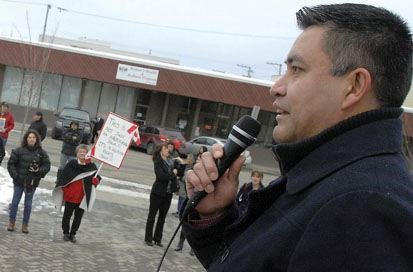School District 57's local First Nations have been denied a say in what happens in schools in their territory, said Carrier-Sekani Tribal Council's tribal chief in a presentation to the school board.
"We haven't seen the strategic plan for our children, nor do we know the allocation of dollars of the last couple of years. This is a grave concern," said Terry Teegee at Tuesday night's meeting.
Teegee said the district disbanded the aboriginal-education advisory board almost two years ago. That board had existed since the 1990s, he said. School District 57 lies within Lheidli T'enneh First Nation and McLeod Lake Indian Band territories and each a representative at the table.
"We would like to have more time with you the trustees to talk about these issues," said Teegee, who estimated about 800 Carrier Sekani children are in the school system. "And more so we would like to know what is happening with the allocation of the dollars that are coming to school district 57 and the decisions that are being made on behalf of our children."
That board, disbanded in the months before the election in fall 2014, used to be involved in both curriculum and oversight of funding, he said. That included helping develop Nusdeh Yoh elementary, Prince George's aboriginal choice school.
"I think for a lot of our children out there in the Prince George area, we need a voice and we need to be heard in terms of the allocation of dollars and how our curriculum is being developed."
The province provides per-student funding for those who self-identify as aboriginal, which makes up the majority of the district's aboriginal education department's budget.
In 2015, 60.5 per cent of aboriginal students graduated, up from the 48 per cent who graduated in 2014, representing some of the worst rates in the province that year.
In an interview after the meeting, Teegee said he believed the board was disbanded because of the issues it was raising.
"What we've seen is that the (previous) board clearly didn't want us around. We were making them be accountable," said Teegee.
Four of the current board members were reelected: Sharel Warrington, Tim Bennett, Trish Bella and Brenda Hooker.
He said the members received notice from former superintendent Brian Pepper, who left his post in December, that they were no longer involved.
"He basically gave us a letter saying this board was being disbanded," said Teegee, adding he hoped the current board would be more open to a conversation. "What I hope that comes out of this is a meeting with trustees with the original ab-ed board and more inclusion of our concerns."
Carrier Sekani used to employ an education worker, but haven't had the ability to do so because of funding cuts for the last seven years or so.
"It speaks to our capacity at CSTC," Teegee said. "Some of these things go by the wayside because it's really difficult to keep up on but now I think we're seeing a definite change in terms of education, not only in the communities with the increased funding from the government but we do have reconciliation agreements with the province."
This spring the district is expected to sign its very first Aboriginal Education Enhancement Agreement, which the Ministry of Education has said leads to improved completion rates, academic achievement, and cultural awareness in most cases.
It is one of the last districts in the province to sign such an agreement, which bring the local First Nations, school district and the province together to collectively set goals around improving aboriginal student success and learning experiences.
As tribal chief, Teegee said he's increasingly been involved advocate for his people around resource development in his territory.
"But I think the most important thing, the most important fight I should say as part of resources within our territory is our children. Our most precious resource is our children."



